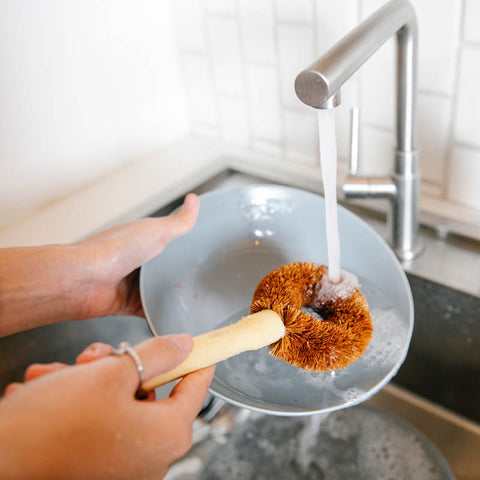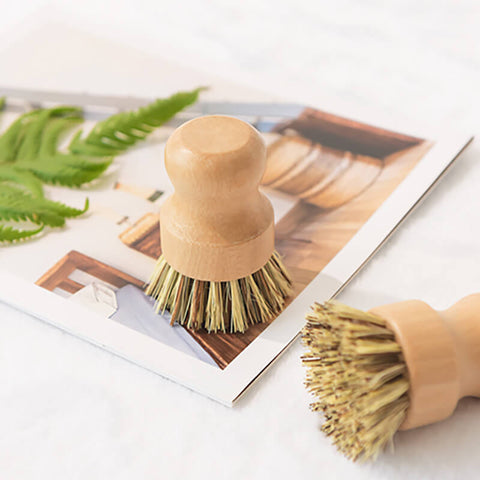Why You Should Use a Natural Dish Cleaning Brush in Your Kitchen (And How to Use It!)
Jan. 24, 2022 | Written by Lana Kisner

Natural brushes are becoming increasingly popular, and they come in every style we could need. From dish brushes to vegetable and bottle brushes, they are eco-friendly and sustainable alternatives to plastic brushes and sponges.
Using a natural dish cleaning brush in your kitchen saves money and effort while also helping the planet. They are sturdy enough to last, and their antibacterial properties keep them cleaner as well. Caring for a natural bristle brush is as easy as allowing it to dry, and the biodegradable materials can be composted.
There are many benefits to using a natural bristle brush. Read on to learn why you should use a natural dish cleaning brush in your kitchen as well as exactly how to use it.
The Benefits of Using a Natural Bristle Dish Brush
The benefits of using natural brushes come from them being eco-friendly and sustainable. Their all-natural materials are both biodegradable and recyclable, and they support an industry working to reduce waste and consumption.
Natural dish brushes are also a cleaner option than plastic alternatives due to the antibacterial properties of the wood that they are made of. While plastic brushes and sponges can harbor bacterial growth, natural brushes don’t offer the same environment. Keeping your natural dish brush bacteria-free is as easy as letting it dry.
Lastly, natural brushes are sturdy and tend to have a longer life than plastic brushes. Some natural brushes also come in two pieces—a wooden handle and the attachable bristles. This allows you to only change your dish scrubber when it gets old rather than having to buy a new brush altogether.
How to Use a Natural Dish Brush

Using natural dish brushes is a similar experience to using traditional sponges or plastic dish brushes. All you need is some soap, a bit of water, and a bit of elbow grease to scrub the dishes clean.
An eco-friendly and sustainable alternative to liquid dish soap has also become the dish soap bar. Many dish soap bars are made from organic ingredients that are gentle on natural fibers, are plastic free, and conserve the amount of soap used.
Soap bars are also a convenient way to add more soap to your dishes when needed, especially when using a palm wooden dish brush or other natural bristle brush. Simply brush a wet dish brush against the bar to gather soap, then wash wet dishes.
Wood has natural antibacterial properties, but moisture can counter these properties by bringing about mold and bacterial growth. Before you store your natural dish brush, set it on a towel with the bristles down. Once the brush is completely dry, place it in a dry place until the next use.
Retiring a Natural Dish Brush
Although natural dish brushes have a longer lifespan than their plastic alternatives, they won’t last forever. So you need to use it properly and store dish brush well. When retiring a natural dish brush, there are two main options.
You can easily recycle a wooden dish brush by giving it a new purpose. Perhaps it is no longer fit for cleaning dishes, but can still be used to clean things like bathrooms or shoes. If the bristles are worn down, the wood can be salvageable for other projects.
If recycling a wooden dish brush doesn’t seem like the right option, then it is best to compost it instead. While any metal parts should be removed and recycled separately, the rest of any natural dish brush can go directly into a compost bin.
Conclusion
Natural dish brushes are easy eco-friendly and sustainable kitchen swaps that are easy to use and simple to care for. Their natural materials last longer than their plastic counterparts, and they offer natural antibacterial properties. Most importantly, they can be composted or recycled when they’ve come to the end of their use.
Keep reading:

